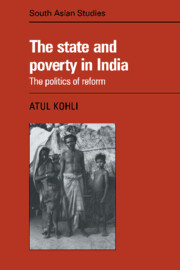Book contents
- Frontmatter
- Contents
- List of Tables and Figures
- Acknowledgements
- Introduction
- 1 The State and Redistributive Reforms
- 2 Democracy and Development in India: an Interpretation
- 3 West Bengal: Parliamentary Communism and Reform from above
- 4 Karnataka: Populism, Patronage, and Piecemeal Reform
- 5 Uttar Pradesh: Political Fragmentation, Middle-Peasant Dominance, and the Neglect of Reforms
- 6 Conclusion: The State and Reform in Democratic–Capitalist Development
- Appendix I On the Political Relevance of Social Classes in a Developmental Setting
- Appendix II Does Agriculture Growth Really “Trickle-down” in India?
- Bibliography
- Index
- CAMBRIDGE SOUTH ASIAN STUDIES
- Frontmatter
- Contents
- List of Tables and Figures
- Acknowledgements
- Introduction
- 1 The State and Redistributive Reforms
- 2 Democracy and Development in India: an Interpretation
- 3 West Bengal: Parliamentary Communism and Reform from above
- 4 Karnataka: Populism, Patronage, and Piecemeal Reform
- 5 Uttar Pradesh: Political Fragmentation, Middle-Peasant Dominance, and the Neglect of Reforms
- 6 Conclusion: The State and Reform in Democratic–Capitalist Development
- Appendix I On the Political Relevance of Social Classes in a Developmental Setting
- Appendix II Does Agriculture Growth Really “Trickle-down” in India?
- Bibliography
- Index
- CAMBRIDGE SOUTH ASIAN STUDIES
Summary
I met a Sculptor in your land.
He carved heads in stone.
A small head had enormous round
eyes and almost no face.
That is poverty, he said.
Rama Krishnan Jaina (Indian poet)Three decades of planned economic development have failed to improve the living conditions of India's poor. This persistence of poverty is clearly manifest in the continuance of low percapita income. It is nevertheless clear by now that higher growth rates, and therefore higher percapita income, are not sufficient to improve the lot of the poor. New wealth has not “trickled down.” The solutions to the problem of India's poverty will thus not emerge from higher rates of economic growth alone; if they emerge at all, they are likely to involve conscious state intervention aimed at reconciling growth with distribution. The analytical issue this raises goes beyond the often-discussed question of suitable development strategies. The more fundamental issue concerns the role of public authorities in economic development: what type of regimes are most likely to pursue a successful redistributive strategy aimed at alleviating the worst of India's poverty?
This volume is a study of redistributive intervention in a developing society. The impact of authority structures and regime types on patterns of socio-economic development has not received the scholarly attention it deserves. An earlier generation of development scholars tended to investigate political phenomena in isolation from their economic context. The study of poverty, for example, would rarely have been considered a legitimate area of enquiry for a political scientist in the 1960s. The more recent neo-Marxist scholarship, by contrast, tends to reduce political analysis to economic forces. Scholars in the so-called dependency perspective would seldom be attracted to analyze the state's redistributive role within capitalist development.
- Type
- Chapter
- Information
- The State and Poverty in India , pp. 1 - 14Publisher: Cambridge University PressPrint publication year: 1987
- 1
- Cited by



